重庆市第三十九中学八年级英语上册 Unit 9 When were you born Sectio
- 格式:doc
- 大小:76.01 KB
- 文档页数:2
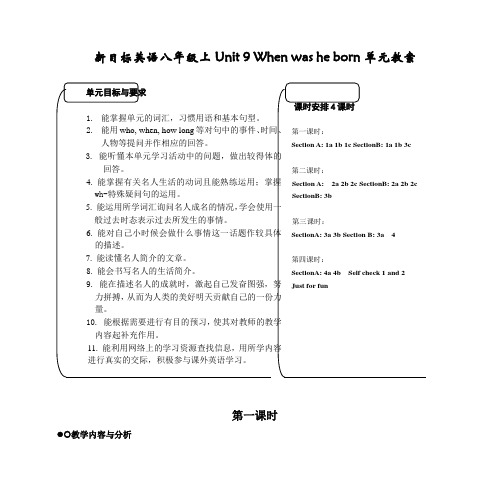
新目标英语八年级上Unit 9 When was he born单元教案教学内容与分析❶教学内容:Section A: 1a 1b 1c SectionB: 1a 1b 3c❷教学目标:a. 能够掌握基本单词和词汇。
b.能够运用基本句型进行提问。
c. 能够运用所学形容词来描述他们所崇拜敬佩的人。
●教学重点、难点分析:❶教学重点:基本单词,词汇和句型。
❷教学难点:能够运用wh-句型用一般过去式提问。
●课前准备❶本课时的教学课件❷教师准备磁带和录音机。
●教学设计教学步骤建议和说明↘热身/复习(Warm-up/Revision)❶ An English song: Twelve months❷ Greetings↘呈现/操练(Presentation/Practice)❶教学句型When were you born? I was born in/on …When was he/she born? He/She was born in/on…T: Student A, How old are you?A: I’m thirteen.T: When is you birthday?A: My birthday is August 16th.T: You were born in 1993.You were born on August 16th,1993.T: Student B, How old are you?B: I’m …T: When is your birthday?B: My birthday is …在学唱中调动学生情感,营造氛围,并有意识地复习前面学过的十二个月份。
已学知识的巩固,真实的情景使学生容易学会如何表达并容易接受所要学的新知识。
T: You were born in …/on….T: Student C, when were you born? T and C: I was born…..T: Student D, what about you? D: I was born ….❷教学in 和on 接时间的区别in接年或月份或年月on接具体的年月日❸学生接龙操练一组A:When were you born?B: I was born in /on… When were you born?C: I was born in/on … When were you born?D: I was born in/on……..❹学生pairwork和performance 并引入When was he /she born ?He/She was born in/on….❺教师呈现一张刘翔的照片。
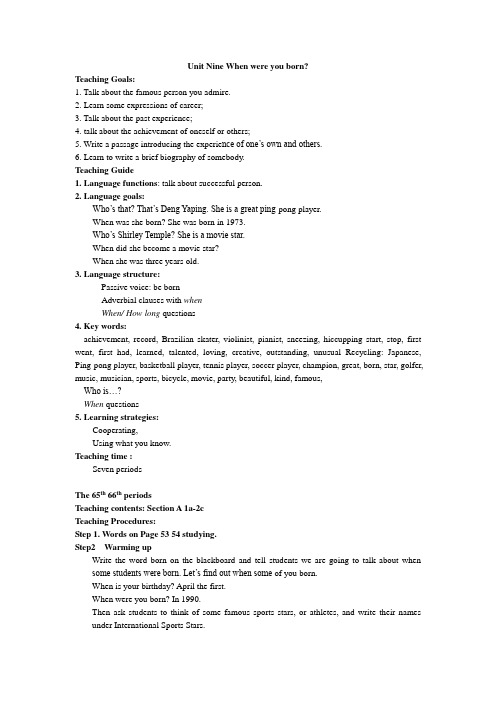
Unit Nine When were you born?T eaching Goals:1. Talk about the famous person you admire.2. Learn some expressions of career;3. Talk about the past experience;4. talk about the achievement of oneself or others;5. Write a passage introducing the experie nce of one’s own and others.6. Learn to write a brief biography of somebody.T eaching Guide1. Language functions: talk about successful person.2. Language goals:Who’s that? That’s Deng Y aping. She is a great ping-pong player.When was she born? She was born in 1973.Who’s Shirley Temple? She is a movie star.When did she become a movie star?When she was three years old.3. Language structure:Passive voice: be bornAdverbial clauses with whenWhen/ How long questions4. Key words:achievement, record, Brazilian skater, violinist, pianist, sneezing, hiccupping start, stop, first went, first had, learned, talented, loving, creative, outstanding, unusual Recycling: Japanese, Ping-pong player, basketball player, tennis player, soccer player, champion, great, born, star, golfer, music, musician, sports, bicycle, movie, party, beautiful, kind, famous,Who is…?When questions5. Learning strategies:Cooperating,Using what you know.T eaching time :Seven periodsThe 65th 66th periodsT eaching contents: Section A 1a-2cT eaching Procedures:Step 1. Words on Page 53 54 studying.Step2 Warming upWrite the word born on the blackboard and tell students we are going to talk about when some students were born. Let’s find out when some of you born.When is your birthday? April the first.When were you born? In 1990.Then ask students to think of some famous sports stars, or athletes, and write their names under International Sports Stars.Step3 ListeningGet the students listen carefully and write the date under each person was born. Play the recording twice and get the students to listen and write down the answers to each picture.Michael Jordan : 1963Martin Hingis: 1980David Beckham: 1975Step4 Pair workPoint out the conversation in the box in activity 1c. ask two students to read it to the class.Ask the students work with a partner. Make your own conversations about the people in the picture. Then ask several pairs to say their conversations to the class.(1c) First ask a pair of students to read the example conversation ,the other students repeat.Then ask the students to work in pairs.(First one person asks a question and then the other person takes a turn.)Demonstrate the activity.Ask the students to work in pairs. Then ask some pairs to act it out .Step5 2A and 2B Listening(2a)Get the students look at the picture and teach them the words hiccup and sneeze. And point out the columns in the chart and read the column headings to the class. Then explain the meaning of the words at the top of each column.Let the students say some of the world’s recorded. then finish the chart on the book(2b) Play the recording twice and then ask the students repeat the sentences one by one. Step6. (2c)Demonstrate the activity.Language points :1)Be born in /on2)How long I slept for about nine hours last night.3)When what time4)Start / begin to do /doing sth5)Stop doing/to do sthThen ask the students to work in pairs.The 67th periodT eaching contents: Section A 3a-4bT eaching Procedures:Step1.Greet the class as usual and check the homework.Step2 .New words learningGolf Brazilian Professional Achievement PerformStep 3, students try to find out some phrases in the text.Invite one student read the little passage then the others read them togetherThen finish the chart belowCheck the answers.Language points:1). Too … to…The boy is too young to go to school.The box is too heavy to carry.2). Start/begin doing/to sth3). National teamStep4.conversation makingStudents work in pairs to make conversation with the information on 3aStep 5.3b.Tell the students the three pairs are all in the big picture above. Please find them in the picture. Make sure the students understand the questions. Then ask them to write the answers according to the picture.4a, InterviewHow old were you when you started doing the things below? interview your classmates and fill in the chart.Write this sample question on the blackboard:When did you learn to ride a bike? then ask two students ask and answer question.Then students ask each other this questionThe 68th periodT eaching contents: Section B 1a-2cT eaching Procedures:Step 1.T each the words:Talented loving outstanding unusual creative Grandchild violinist skating skater becomeStep2. Ask students to name the places in the pictures ,Using the words giving to describe the pictureStep 3.Make a conversation with one student. The student should tell the truth. Then ask the students to make conversations like this.Step 4. 2a and 2b listening partPlay the recording three times for the students finish 2a and 2b.Language points:1). Sb spend time/money on/(in) doing sthSb pay money for sthSth cost sb moneyIt take sb time to do sth2). See sb do sth see sb doing sthStep 5 2c.Make a short conversation with one student.T: who is Midori? S1:She is a famous violinist..T :When was she born? S2:She was born in 1971.Then ask the students to practice in pairs and to take both roles.The 69th periodT eaching contents: Section B 3a-2c4T eaching Procedures:Step 1 words on Page 57 studying.Step 6. 3a.1. Ask the students to read the passage silently and circle the description words.2. Answer the questions students may have.3. language points.1)A piece of paper / advice / meat /music2)At the age of When3)Take part in join4)Win first prize5)10-year history 数词+”-“ + 名词(sing.) 数词+”-“ + 名词(sing.)+ 形容词4. Play the tape for the students listen and repeat.5. Students read the passage aloud.Step 2. 3b.Look at the information in activity 2b .W rite an article about LauraThen ask some students to read their ownThe 70th periodT eaching contents: Self CheckT eaching Procedures:Step 1. Words on P58 studying.Step 2. Self check 1Ask the students read the words one by one and find out the meanings of any words they don’t know.Step4. Self check 21. Students read the passage.2. Make sure the students understand the phrases:Start to. do sth. Be born inTake a taxi Tsinghua UniversityJoin a team The first prizeMajor in In the speech competition3. Students read together4. Enjoy just for fun together.。
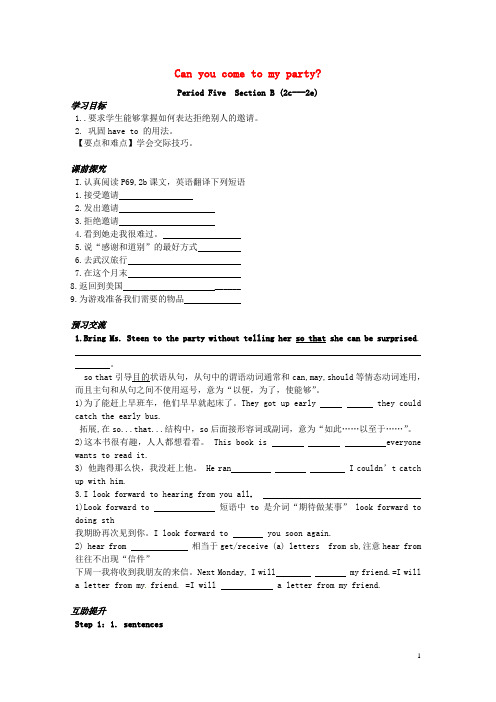
Can you come to my party?Period Five Section B (2c---2e)学习目标1..要求学生能够掌握如何表达拒绝别人的邀请。
2. 巩固have to 的用法。
【要点和难点】学会交际技巧。
课前探究I.认真阅读P69,2b课文,英语翻译下列短语1.接受邀请2.发出邀请3.拒绝邀请4.看到她走我很难过。
5.说“感谢和道别”的最好方式6.去武汉旅行7.在这个月末8.返回到美国 ______9.为游戏准备我们需要的物品预习交流1.Bring Ms. Steen to the party without telling her so that she can be surprised.。
so that引导目的状语从句,从句中的谓语动词通常和can,may,should等情态动词连用,而且主句和从句之间不使用逗号,意为“以便,为了,使能够”。
1)为了能赶上早班车,他们早早就起床了。
They got up early they couldcatch the early bus.拓展,在so...that...结构中,so后面接形容词或副词,意为“如此……以至于……”。
2)这本书很有趣,人人都想看看。
This book is everyonewants to read it.3) 他跑得那么快,我没赶上他。
He ran I couldn’t catchup with him.3.I look forward to hearing from you all.1)Look forward to 短语中to 是介词“期待做某事” look forward todoing sth我期盼再次见到你。
I look forward to you soon again.2) hear from 相当于get/receive (a) letters from sb,注意hear from往往不出现“信件”下周一我将收到我朋友的来信。
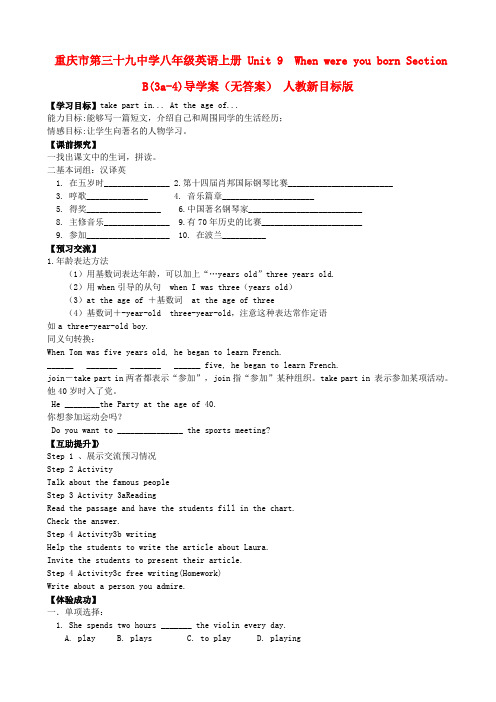
重庆市第三十九中学八年级英语上册 Unit 9 When were you born Section B(3a-4)导学案(无答案)人教新目标版【学习目标】take part in... At the age of...能力目标:能够写一篇短文,介绍自己和周围同学的生活经历;情感目标:让学生向著名的人物学习。
【课前探究】一找出课文中的生词,拼读。
二基本词组:汉译英1. 在五岁时_______________2.第十四届肖邦国际钢琴比赛________________________3. 哼歌______________4. 音乐篇章_____________________5. 得奖_________________6.中国著名钢琴家__________________________8. 主修音乐_______________ 9.有70年历史的比赛_______________________9. 参加___________________ 10. 在波兰__________【预习交流】1.年龄表达方法(1)用基数词表达年龄,可以加上“…years old”three years old.(2)用when引导的从句 when I was three(years old)(3)at the age of +基数词 at the age of three(4)基数词+-year-old three-year-old,注意这种表达常作定语如a three-year-old boy.同义句转换:When Tom was five years old, he began to learn French.______ _______ _______ ______ five, he began to learn French.join-take part in两者都表示“参加”,join指“参加”某种组织。
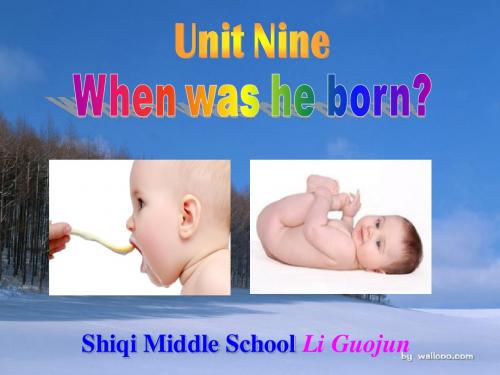
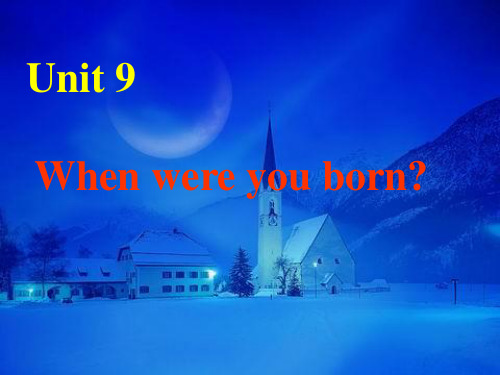
Unit 9 When was he born(第3课时)【学习目标】:辞汇:talented, unusual, creative, loving, outstanding, kind, unusual, grandson, skate, tour, university,major短语:take part in, major in, a piece of music, at the age of, because of句型:1. He spends all his free ti me with his grandson..2. He began to learn the accordion at the age of four..3. When still a small boy, he could hum songs and difficult pieces of music.4. She started ice skating when she was four.语法:when引导的时刻状语从句【重点】:能够运用所学形容词来描述他们所崇拜佩服的人;能读懂名人简介的文章。
【难点】:能在描述名人的成绩时,激起自己发奋图强,尽力拼搏,从而为人类的美好明天奉献自己的一份力量。
预习案自主学习写出汉语:1. a well—known Chinese pianist2. hum songs3. pieces of music4. began to learn the accordion5. at the age of four6. started to learn to the piano7. took part in8. won first prize9. in the 70—year history of the competition用所给词的正确形式填空1. She ______ (be) born in 1985.2. _____ you _____(see) your father an hour ago.3. She ______(have) a short rest when he got home.4. He_____ (not come) to school yesterday because he was ill.5. David Beckham is a ________(talent) football player.6. His father is good at ________(skate).7,The old man is still_____(live)探讨案Ⅰ.质疑探讨--- 质疑解疑、合作探讨take part in“参与、参加”后接某项活动。
Unit 9 When was he born(第4课时)【学习目标】:把握本单元单词,经历重点句型,能用过去时写出描述活动的的短文【重点】:能够运用所学形容词来描述他们所崇拜佩服的人;能读懂名人简介的文章。
【难点】:能在描述名人的成绩时,激起自己发奋图强,尽力拼搏,从而为人类的美好明天奉献自己的一份力量。
预习案自主学习重点辞汇拓展1. 钢琴____________ (复数) __________ __2. 第一____________ (基数词) ____________3. 参观____________ (名词) ____________4. 亚洲____________ (形容词) ____________5. 有制造力的____________ (动词) ____________二、重点词组识记1. 参加___________________2. 在……岁_____________________3. 取得一等奖____________________4. 一名闻名的中国小提琴手_____________________5. 一名仁慈可爱的奶奶____________________6. major in____________________7. in the 70-year history____________________8. spend all one’s free time with sb____________________Ⅲ.我的疑惑【提示】请你将预习中未能解决的问题和有疑惑的问题写下来,等到课堂上与教师和同窗探讨解决。
探讨案Ⅰ.质疑探讨--- 质疑解疑、合作探讨温习归纳重点短语:1. 一名很棒的乒乓球运动员2. 国际体育明星3. 花费某些时刻做某事4. 花费某些时刻在某事上5. 一名出名的中国钢琴家6.几首音乐7. 开始学习手风琴8. 在4岁时9. 参加10. 得奖11. 在70年的竞赛历史上12. 因为。
重庆市第三十九中学八年级英语上册 Unit 9 When were you born Section A(3a-4b)导学案(无答案)人教新目标版【学习目标】1.when引导的状语从句2.too...to...能力目标:能用有关的形容词来描述人,并能用一般过去时来谈论熟知的、敬佩的人物.情感目标:让学生学会合作交流,形成正确的人生观和世界观。
【课前探究】一找出课文中的生词,拼读。
二基本词组:汉译英1.太…不能_________2.例如 _____________3. 为国家队踢球________________________4.当他9个月大的时候____________________5.中国体操运动员____________6. 骑自行车 _______________7电影明星________________ 8.赢得金牌 _______________9.京剧表演者______________ 10.在世界锦标赛上_______________【预习交流】1. too…to的含义及用法“too…to…”是英语中常用的一种结构,其句型为“too+形容词或副词原级+to do …”,译为“太…而(以致)不能…”。
它在形式上是肯定的,但在意义上是否定的。
“too…to…”本身已含有否定的意思,因此,不定式前一般不加not.判断下列句子的正误:她太小不能去上学。
She is too young not to go to school. ()She is too young to go to school. ()水太烫不能喝。
The water is ______ hot ______ drink.2. when的用法:(1)作疑问副词,意为“什么时候”When did Tony go to the library?托尼什么时候去的图书馆。
(2)作从属连词,引导一个时间状语从句,意为“当…的时候”当他是个小男孩时,他就开始表演京剧。
Unit 9 Can you come to my party?【励志话语】:Slow and steady wins the race. 稳扎稳打无往而不胜【目标】:1.复习掌握本单元的单词及短语,句型2.学会委婉地回答邀请,接受或拒绝【重难点】:重点: 复习掌握本单元的单词及短语。
难点 : 学会委婉地回答邀请,接受或拒绝自主预习(一)预习任务熟悉掌握本单元单词和短语。
(二)预习诊断1. 客人2. 日历3. 白天4. 购物5. 去音乐会 6 、在周末7、我恐怕不行,我要在家照顾小妹妹。
8、我也许可以,但是我不确定。
9、让我们明天晚上一起去看电影。
10、你放学后可以和我一起去踢足球吗?(三)预习疑问你在预习中遇到的问题有哪些?二.合作交流1、预习交流讨论完成3b2、合作学习完成43、拓展延伸完成self-check4、系统总结能正确运用表示三、自测达标一.根据句子内容完成已给了首字母的单词。
1. Tom asked me what that day was and I told him it was M__________. .2. Mary i____________ Tim t o her birthday party but Tim couldn’t, because he had lots of homework to do.3. When I phoned Xiao Ming , he was playing s__________. .4. We will go to the movie with our parents on W____________. .5. Thank you for your invitation to visit, but I have to go to the d___________.I had a flue.6. You should write everything you have to do next week on the c___________ .7. This Sunday I will have a p lesson. I’ll learn some new music.8. Mary can’t go on a trip. Sh e has to study for a C ___________ test.二.单项选择。
重庆市第三十九中学八年级英语上册 Unit 9 When were you born Section A(3a-4b)导学案(无答案)人教新目标版
【学习目标】
1.when引导的状语从句
2.too...to...
能力目标:
能用有关的形容词来描述人,并能用一般过去时来谈论熟知的、敬佩的人物.
情感目标:让学生学会合作交流,形成正确的人生观和世界观。
【课前探究】
一找出课文中的生词,拼读。
二基本词组:汉译英
1.太…不能_________
2.例如 _____________
3. 为国家队踢球________________________
4.当他9个月大的时候____________________
5.中国体操运动员____________
6. 骑自行车 _______________
7电影明星________________ 8.赢得金牌 _______________
9.京剧表演者______________ 10.在世界锦标赛上_______________
【预习交流】
1. too…to的含义及用法
“too…to…”是英语中常用的一种结构,其句型为“too+形容词或副词原级+to do …”,译为“太…而(以致)不能…”。
它在形式上是肯定的,但在意义上是否定的。
“too…to…”本身已含有否定的意思,因此,不定式前一般不加not.
判断下列句子的正误:
她太小不能去上学。
She is too young not to go to school. ()
She is too young to go to school. ()
水太烫不能喝。
The water is ______ hot ______ drink.
2. when的用法:
(1)作疑问副词,意为“什么时候”
When did Tony go to the library?
托尼什么时候去的图书馆。
(2)作从属连词,引导一个时间状语从句,意为“当…的时候”
当他是个小男孩时,他就开始表演京剧。
___________________, he began to perform Beijing Opera.
【互助提升】
Step 1 、展示交流预习情况
Step 2 Activity 3a
Talk about the famous people
-Who is Shirley Temple?
-She’s a…
-When did she become a movie star?
-When she was three years old.
Have the students read the passage and fill in the chart.
Check the answer.
Step 3 Interview How old were you when…?
【体验成功】
一.将下列句子补充完整:
1.她太老了走不动了。
She is _______ ________ ________ walk.
2. 王先生三岁就开始画画了。
Mr Wang ______ ______ ______ he _____ three years old.
3.当我八岁的时候,我就开始学习骑自行车了。
______ I _____ eight. I started ______ to ______ a bike.
二. 读句子,请在符合句意的词下面划线。
1. I (am, was)a middle school student now. I (go, am going)to college in America after I finish high school.
2. When I (am/was)seven, I (start/started)learning skating.
3. Shirley Temple(becomes/became)famous at the age of three.
4. I usually (visit/visited)my grandparents on weekends. Last Sunday I(go/went)to the aquarium.
5. My mother sometimes(watches/watched)TV in the evening. Last night, she (goes/went)to the movies.
6. I (am going, went)to the aquarium with my friends next Sunday.
7. I (study/studie d)for English test yesterday.
8. Lucy and Lily(is,are)going to spend their holiday in China.
【快乐心得】
_______________________________________________________________________________ ____________。